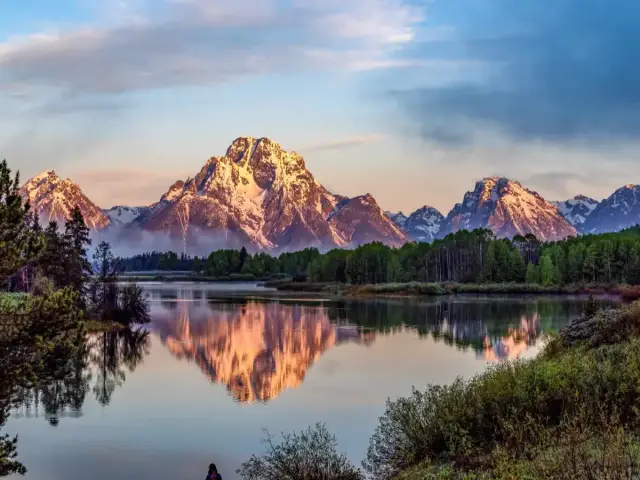There’s nothing better for me than being immersed in nature. Whether I’m staring up into redwood trees, coming across a profusion of wildflowers, listening to ocean waves, or being mesmerized by a star-jeweled summer sky, I can’t help but feel awe, that wonder and sense of being part of something grander than myself.
I’m not alone, either. People commonly experience awe in nature—so much so that researchers often expose people to nature in order to study awe’s effects on their well-being. Feeling awe has been found to provide many benefits, including greater happiness, more humility and curiosity, better health, and kinder, more generous behavior toward others.
Now, scientists are beginning to discover another benefit of experiencing awe, particularly from nature: It makes us more motivated to protect the natural environment. As one recent study found, giving people information about climate change and the potential benefits of renewable energy is not enough to sway public opinion. It could take adding a dose of awe—helping people experience a sense of wonder for our amazing, fragile planet—to get them to change their attitudes toward climate change and make better choices for the environment.
X
Given the current state of the world, this is good news. Human activity is causing harm to the planet on an alarming scale, hurting our well-being and challenging our very survival. Yet it can be overwhelming to contemplate the extent of the damage, making us feel depressed or powerless to do anything to help. We need to find ways to stay hopeful and focused, to both protect our Mental health and help save our planet. That’s where experiencing awe may help.

Experiencing awe inspires ecological consciousness
Much evidence suggests that feeling awe can increase our ecological consciousness—a sense of responsibility to help protect the natural world. For example, in one study, college students were prompted to write about a past encounter with awe-inspiring nature or an awe-inspiring person (or simply an everyday event). Those who wrote about nature experienced awe, which led them to feel a greater sense of connection to nature. As a result, they had a stronger intent to participate in ecologically sustainable behaviors, like recycling or taking shorter showers.
Another recent study found that when people felt awe, it helped them be more attuned to climate change issues. Specifically, participants who were induced to feel awe by watching a nature video felt a greater sense of “oneness” with nature compared to people watching an amusing nature video or neutral video. In turn, they were also more likely to agree with statements like “Human activities are a major cause of climate change” and “The consequences of climate change are visible now,” suggesting they could grasp the import of climate change more readily.
Studies suggest that tourists who experience awe show more support for more environmentally sound behaviors, too. For example, one study found that people experiencing awe by gazing at spectacular scenery in a Chinese national park had stronger intentions to engage in pro-environmental behaviors, like taking their trash with them and getting involved in movements to protect the park. And, as another study found, whale-watchers who listened to whales singing in the wild or to pre-recorded whale sounds experienced awe, increasing their interest in environmental protection.
These effects extend to behaviors, not just attitudes. For example, one study found that professionals working in or near water—such as field biologists or those in water management—made more environmentally friendly work decisions and inspired more conservation efforts in others if they experienced more awe of nature in their work and leisure time. Similarly, another study found that farmers who experienced a stronger connection to nature, which awe induces, were more likely to take steps to protect native vegetation on their farms and engage in restoration efforts.

What makes awe so powerful?
All of this suggests awe promotes more environmentalism. But how?
As many of the above studies suggest, awe seems to increase our sense of connection to nature. In fact, a large-scale analysis of many studies concludes that there’s a robust relationship between our connection to nature and our engagement in environmental protection.
Awe may help us connect to nature and environmentalism by making us feel less self-centric and more self-transcendent. When experiencing awe, we feel as if we’re a small part of something bigger and vaster than ourselves, which inspires us to act more generously and selflessly. So, when people experience a smaller sense of self in relationship to the vastness of nature, it could make them more concerned about protecting it. After all, if you care enough about something (or someone), you’ll want to do what you can to keep them safe and healthy, even if it means doing so at some personal cost to you.
Awe also helps protect our Mental health, which may seem less relevant here. But when we are suffering from depression or feeling stressed out, it’s harder to muster the energy to do something constructive—especially if it means forgoing what’s easier (like driving to work) in favor of doing something that takes more effort (like walking or biking to work). Because awe can help us feel less depressed and stressed, though, it’s likely to help us stay true to our environmental values and take necessary action even when it’s inconvenient.
Similarly, according to research, feeling happier means we have more energy for engaging in activism, including that focused on environmental protection. And feeling awe definitely makes us happier, in part by making time slow down, helping us feel absorbed in the present, and encouraging other positive emotions (like compassion, gratitude, and optimism—all tied to happiness).
Awe may also help us be environmental activists through its ability to foster cooperation and social connection. If we can connect better not only with nature but with those who are concerned about its protection, we might engage in more collective action to fight against pollution, climate change, species loss, and more.
In all of these ways, feeling awe may give us the perspective and the fuel we need to be more active in protecting the natural world. And, fortunately, it’s possible to increase our sense of awe in nature with deliberate effort.

How to cultivate awe in nature
One way to foster awe for nature is to go hiking, something I often do myself. Just being out among beauty feeds my soul and makes me feel in awe of nature’s beauty and biodiversity.
You can also enhance your feelings of awe by taking an awe outing, where you slow down and immerse yourself in the sensory details of your environment. By taking deep breaths and noticing what’s around you—the sounds, smells, sights, and more—and taking into consciousness what seems vast, complex, or surprising, you can experience awe and reap its benefits.
If taking an awe walk in nature isn’t convenient or possible for you, though, there are other ways to experience the awe of nature and feel its effects. Watching awe-inspiring videos of nature or simply paying special attention to the natural elements around you in your everyday life (like clouds, stars, or flowers) can also inspire awe, helping you to feel joy and transcendence.
We can also inspire kids to feel awe and reconnect to nature. Children benefit immensely from being outside, which helps protect their mental and physical health. And infusing awe into their experience at home or at school may make those impacts even more pronounced. Instilling a sense of awe in nature for children is one way we can help raise our future environmentalists.
So why not add awe in nature to your repertoire? By letting yourself feel wonder and a sense of being a small part of a vaster and grander natural world, you can enjoy the benefits that awe provides while also becoming part of the concerted movement to help save our planet.













